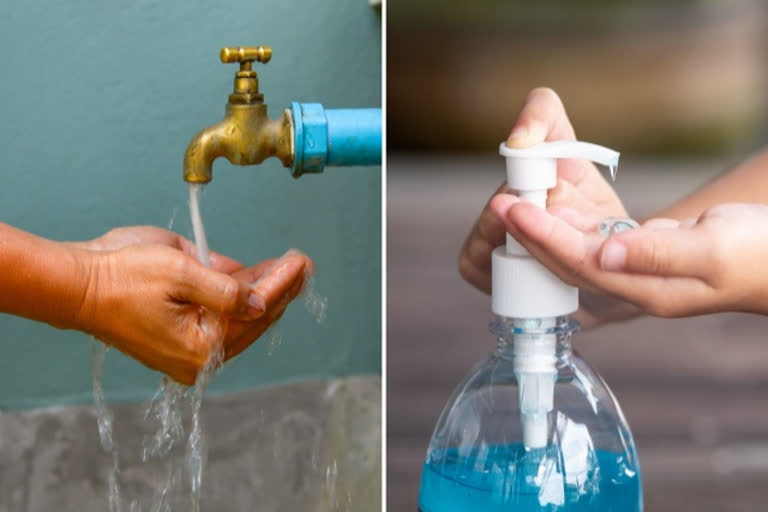Frequent use of sanitizers has become a common practice, thanks to the pandemic. It’s been over 3 months that we have been actively dealing with sanitizers. Prices of sanitizers have spiraled up signaling a boom in these markets. People are wondering whether to use soap or a sanitizer to stay safe. We spoke to Dr. Sailaja, Cosmetic Dermatologist.
-What is the difference between a “washing your hands” and using a “using a Hand sanitizer”
Washing your hands the traditional way is far superior to using hand sanitizer. Soap lifts dirt, germs and oil from dirty hands to give you a better, overall cleansing. Soap and water are more proven to be more effective than hand sanitizers at removing certain kinds of germs . Unlike hand sanitizer, soap also can eliminate pesticides and other chemical residues that are lingering on your hands.
Hand sanitizers are mainly two types: Alcohol based hand sanitizers and Non-Alcohol based hand sanitizers
According to a new study, quickly smearing an alcohol-based hand sanitizer onto your hands won't kill cold and flu bugs. This is because your fingers are still wet with mucus.
-What are the consequences of excessive use of sanitizers?
Most common is irritation of the skin, redness, eczema, dryness, Itching, cracks, bleeding and flare up of psoriasis, burning sensation on the previously injured areas.
Other effects seen are alcohol poisoning (when not used as per the directions of usage) or in cases of accidental / intentional consumption.
The effects of long-term use of sanitizers in pregnant women and children exposed to the three active ingredients in sanitizers are still under review.
Additionally, there are concerns that using antibacterial hand sanitizers and soaps–like those that include bacteria-killing chemicals can contribute to antibiotic-resistant bacteria.
Over time, use of alcohol-based hand sanitizers can cause the skin on your hands to age more rapidly than it would naturally, as dry skin is prone to developing wrinkles and other blemishes
What is your opinion on children using hand sanitizers?
Hand sanitizer is unsafe around small children and some adults. Swallowing alcohol-based hand sanitizers can cause alcohol poisoning. Alcohol based hand sanitizers are safe when used as directed, but they can cause alcohol poisoning if a person swallows more than a couple of mouthfuls. There are risk of fire accidents & burns in case of irrational / unsupervised use next to a flame or in a kitchen area.
How could we educate the general public on judicious use of sanitizers?
In case of inevitable situations like supermarkets or places where you visit less often or stay for a short time you can use sanitizers whereas in the places where you stay or work for a longer time regularly it is always better to organize hand washing facility in a permanent way. Please do remember that the hand sanitizers should not be used close to the flame. It might cause fire accidents and burns.
What if a person develops skin sensitivity after using a hand sanitizer but cannot do without it?
If you do need to use an alcohol-based hand sanitizer, make sure to use some kind of hand lotion with moisturizer soon after the usage of hand sanitizer.
In absence of a sanitizer or unavailability or non-affordability of the same how does one maintain the level of sanitization?
Wearing gloves and removing it after the task like shopping in case of lack of washing facilities, washing with fresh water & soap is far superior to the sanitizers at any time.
The best way to prevent the spread of infections and decrease the risk of getting sick is by washing your hands with plain soap and water, advises the Center for Disease Control and Prevention (CDC). Washing hands often with soap and water for at least 20 seconds is essential, especially after going to the bathroom, before eating, after coughing, sneezing, or blowing one’s nose. If soap and water are not available, CDC recommends, consumers use an alcohol-based hand sanitizer that contains at least 60% alcohol.
Many surface cleaners and disinfectants say they can be used against SARS-CoV-2. What does this mean? Can I use these products on my hands or body to prevent or treat the virus?
Always follow the instructions on household cleaners. Do not use disinfectant sprays or wipes on your skin because they may cause skin and eye irritation. Disinfectant sprays or wipes are not intended for use on humans or animals. Disinfectant sprays or wipes are intended for use on hard, non-porous surfaces.
Inputs from:
Dr. Sailaja Kaza Surapaneni, MBBS, MD
Cosmetic Dermatologist, SRI Clinic.
